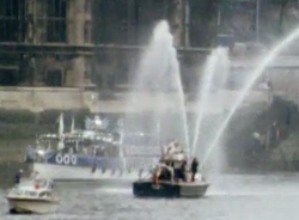The Sex Pistols
Caerphilly, Wales. A quiet core mining community in the heart of the Welsh valleys. In December 1976, panic gripped this little town. It was facing invasion by the Sex Pistols and their barbarian horde. Frightened churchgoers gathered outside the town’s Castle Cinema, led by a local pastor. “We do protest that this thing has come to Caerphilly.”
But what was it that had the good people of Caerphilly in such a tizzy?
News reader “The cult is called punk. The music, punk rock.”
And in the vanguard - The Sex Pistols.
Punk Rock
News reporter “Punk rock has become almost a battle cry in British society. For many people it’s a bigger threat to our way of life than Russian communism or hyperinflation. We will be hearing from city councillors in London, in Glasgow and Newcastle, whose councils have banned punk rock concerts.”
For these guardians of public morality, punk was a frontal assault on British reserve and common decency. But despite the outcry, The Sex Pistols’ anarchy tour was on its way to Caerphilly.
That night the old Britain came face-to-face with the new. Over there were the God-fearing, polite, well-mannered, deferential. Standing right here was a new generation, who revelled in being confrontational, insulting, provocative. Each side was equally bewildered by the other.
I’ve got a flyer that was handed out by the churchgoers outside the concert hall. They describe punk rock as a rampant evil, the direct result of our national rejection of God.
But there is hope, they say, for punks who turn from their wicked ways and embrace redemption. The vilest offender who truly believes, that moment from Jesus a pardon receives.
Perhaps God really was on the protesters side. Out of 630 tickets, only 60 were sold.
The Barbarian Horde
Tonight, some of the original troublemakers are gathering again in Caerphilly… To celebrate their modest part in the punk story. A Sex Pistols tribute band is headlining at the town’s Workmen’s Hall. What was once so shocking has become part of local legend, a moment not for fear, but for nostalgia.
Post-war Britain had seen Teddy boys, mods, rockers and skinheads come and go. There was something different about punk that made it all the more shocking. It wasn’t just about the gob and the noise. With their outrageous clothes and their provocative lyrics, punks were assaulting Britain’s most cherished cultural icons.
30 years on, many people still revered the legacy of our finest hour. The memory of the war hung heavy in our culture. From the TV schedules… To the games we played.
For those who hadn’t lived through the war and the austerity of its aftermath, all of this looking backwards would seem intensely stifling. As one of the Sex Pistols’ teenage fans put it, she hated everybody always harping on about Hitler. Teenagers sporting swastikas, songs of Nazi death camps, could there be anything more likely to upset a generation shaped by the war? There certainly could.
For the Sex Pistols had another target, the nation’s cherished figurehead. “God save the Queen the Fascist regime. God save the Queen she ain’t no human being. That is no future in England’s dreaming.” It’s hard to think of any lyrics that would be more likely to inflame the great majority of public opinion.
For the originals, punk was great fun. Unbridled, youthful energy and the chance to be very, very rude. For millions of others though, it was as though the forces of anarchy were let loose in 70s Britain. The days of deference was a distant memory.
Tradition Retaliates and Prevails
But in the summer of 1977, tradition hit back. In May, the Queen set off on a nationwide tour. After years of disturbing change, the Silver Jubilee was widely greeted with relief and joy. This was the voice of the silent majority.
My first memories are of the Jubilee summer of 77. I wasn’t yet three but I vividly remember how enthusiastically my parents got involved with the village celebrations. Most people really loved the Jubilee. Here at last was a chance to forget all the bad news and pull together as one nation.
On Thursday, 9 June 1977, the celebrations drew to a highly-choreographed close, a display of pageantry that Britain still did best. The Queen’s river progress deliberately echoed the Thames journeys of her namesake Elizabeth I, another sovereign who had guided her people through troubled times.

Hundreds of thousands of people lined the riverside walkways. Tens of millions more tuned in to watch at home. For a few hours, at least, the Queens people could forget the grim reality of economic decline. It was time for a party. And then onto the highlight of the evening, the finale was a dramatic firework display, the biggest London had ever seen.
As the Queen looked out on her people below, the huge crowd struck up Jerusalem. From up here, life in Britain really didn’t seem quite that bad. 70s Britain remained a country of contradictions, a place of discord and discontent, and yet, still somehow beneath it all, a land of hope and Glory.
External Links
The Sex Pistols - Official Web Site
The Silver Jubilee -The British Monarchy
